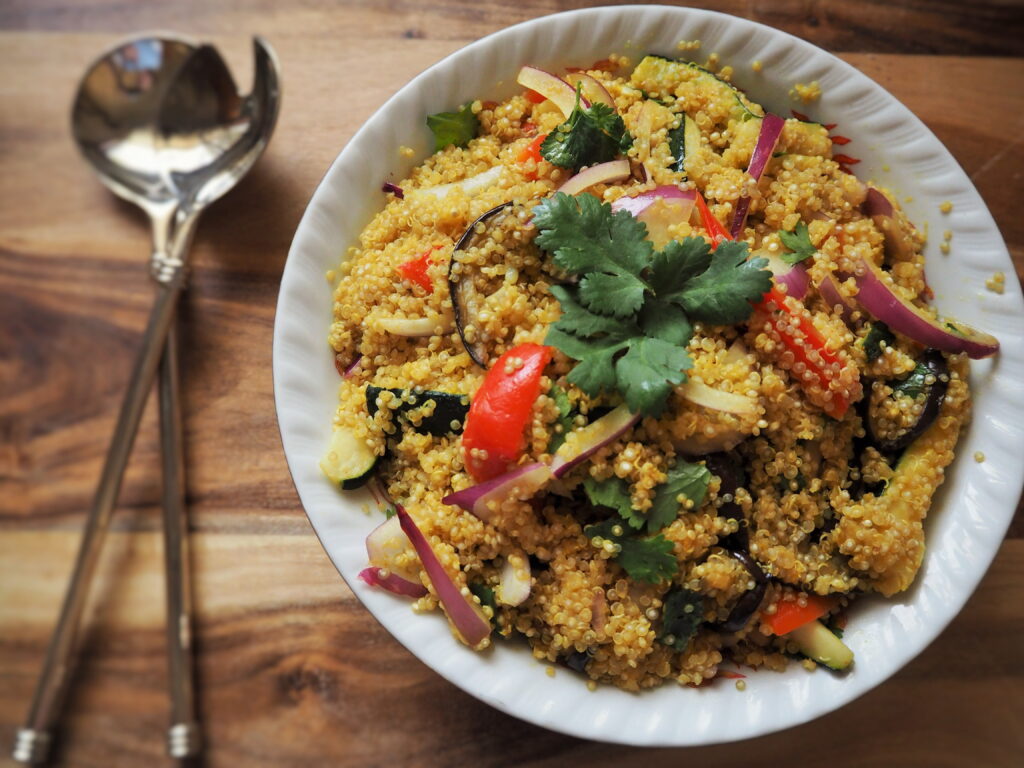

Quinoa, often referred to as a “superfood,” offers a wide range of health benefits. This nutrient-rich grain is a great source of complete protein, containing all nine essential amino acids, making it an excellent choice for vegetarians and vegans. Quinoa is also high in fiber, aiding in digestion and promoting a feeling of fullness, which can be beneficial for weight management.
Additionally, quinoa is rich in vitamins and minerals, including magnesium, potassium, and iron, which contribute to overall health. It’s a gluten-free grain, making it suitable for those with gluten sensitivities or celiac disease. Quinoa is known to have antioxidants, which help protect the body from free radical damage and reduce the risk of chronic diseases.
Furthermore, quinoa has a low glycemic index, helping to stabilize blood sugar levels. Its high fiber content contributes to better heart health by lowering cholesterol levels and reducing the risk of heart disease. Overall, incorporating quinoa into your diet can provide a nutrient boost, enhance your overall health, and diversify your meal options.
BENEFITS
- Complete Protein Source : Quinoa is unique among plant-based foods because it is a complete protein, containing all nine essential amino acids. This makes it an excellent choice for vegetarians and vegans looking to meet their protein needs for muscle health, tissue repair, and overall body function.
- Rich in Nutrients: Quinoa is loaded with essential nutrients, including vitamins like B vitamins (B1, B2, B3, B6), vitamin E, and minerals such as magnesium, potassium, phosphorus, and iron. These nutrients support various bodily functions, including energy production and bone health.
- High Fiber Content: Quinoa is an excellent source of dietary fiber, which aids in digestion, helps maintain bowel regularity, and promotes a feeling of fullness. The fiber content can be beneficial for weight management and preventing overeating.
- Gluten-Free: Quinoa is naturally gluten-free, making it a safe and nutritious option for individuals with celiac disease or gluten sensitivity. It can be used as a replacement for gluten-containing grains like wheat, barley, or rye.
- Antioxidant Properties: Quinoa contains antioxidants, such as quercetin and kaempferol, which help protect the body against oxidative stress and reduce the risk of chronic diseases, including certain types of cancer.
- Heart Health: The high fiber content in quinoa can help lower cholesterol levels, reducing the risk of heart disease. Additionally, quinoa’s magnesium and potassium content helps regulate blood pressure and maintain overall cardiovascular health.
- Low Glycemic Index: Quinoa has a relatively low glycemic index (GI), which means it has a minimal impact on blood sugar levels when compared to high-GI foods. This is beneficial for managing blood sugar and preventing spikes and crashes in energy levels.
- Weight Management: The combination of protein and fiber in quinoa helps control appetite and promote a sense of fullness, which can aid in weight management and healthy eating patterns.
- Bone Health: Quinoa contains significant amounts of magnesium, phosphorus, and calcium, all of which contribute to strong and healthy bones. Adequate calcium intake is essential for preventing osteoporosis.
- Versatile and Delicious: Quinoa is a versatile ingredient that can be used in a variety of dishes, from salads and soups to grain bowls and breakfast porridge. Its nutty flavor and slightly crunchy texture make it a popular choice in many cuisines.
Recipe for make easy
Protein is indispensable for the human body. It serves as the fundamental building block for tissues, muscles, and organs, promoting growth and aiding in tissue repair. Additionally, proteins function as enzymes, catalyzing vital chemical reactions, and act as antibodies, bolstering the immune system’s defenses. Hormones like insulin and growth hormone, both proteins, regulate key bodily functions. Proteins also play a role in oxygen transport, structural support, and can serve as an energy source when needed. In essence, protein is a fundamental nutrient that contributes significantly to the structure and function of the human body.






